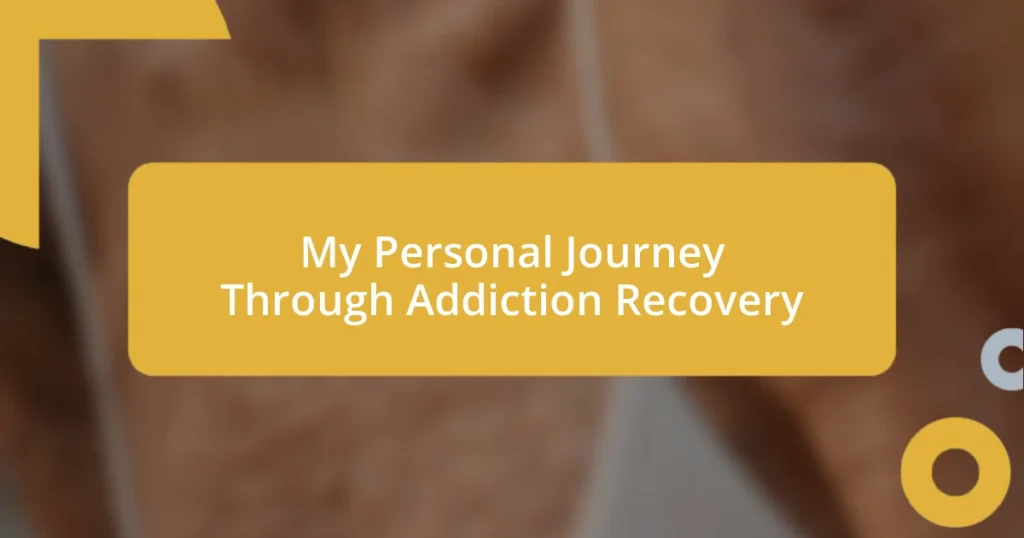Key takeaways:
- Recognizing the need for help was a pivotal moment, leading to the realization of the importance of support and vulnerability in recovery.
- Seeking professional support, such as therapy and support groups, provided essential tools and safe spaces for emotional healing.
- Celebrating milestones, both big and small, reinforced motivation and fostered a sense of community, contributing to long-term recovery success.
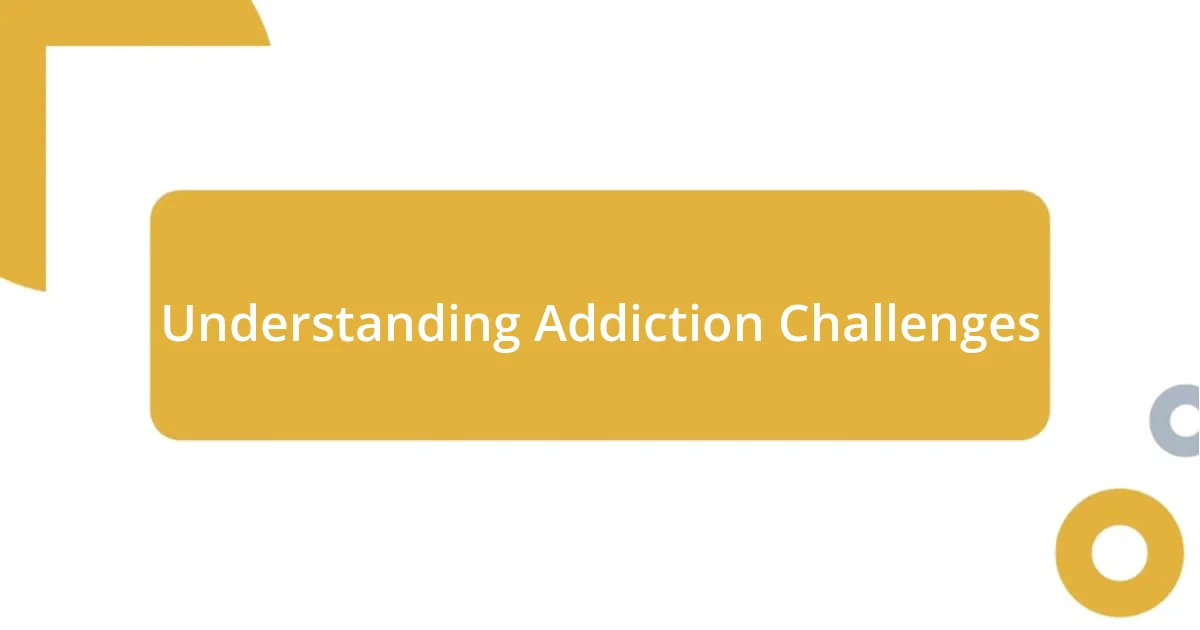
Understanding Addiction Challenges
Addiction challenges are insidious, often preying on vulnerabilities we may not even be aware of. I remember grappling with feelings of loneliness, despite being surrounded by friends. How could I feel so isolated in a crowd? This contrast was confusing, yet it highlighted how addiction can warp our perception of connection and support.
I discovered that triggers can emerge from the most unexpected places—like a song on the radio or a scent that reminds me of the past. It’s fascinating yet painful how deeply ingrained memories can influence our choices. Have you ever experienced a moment that suddenly took you back to a time you’d rather forget? These instances remind me how crucial it is to develop strategies to navigate these emotional minefields.
Moreover, the journey through addiction recovery isn’t just about abstaining from substances; it’s about confronting the emotional turmoil underneath. I often felt an overwhelming sense of shame that clouded my self-worth. It’s a striking realization that understanding these challenges is essential, not just for our own healing, but also to foster empathy toward others who fight similar battles.
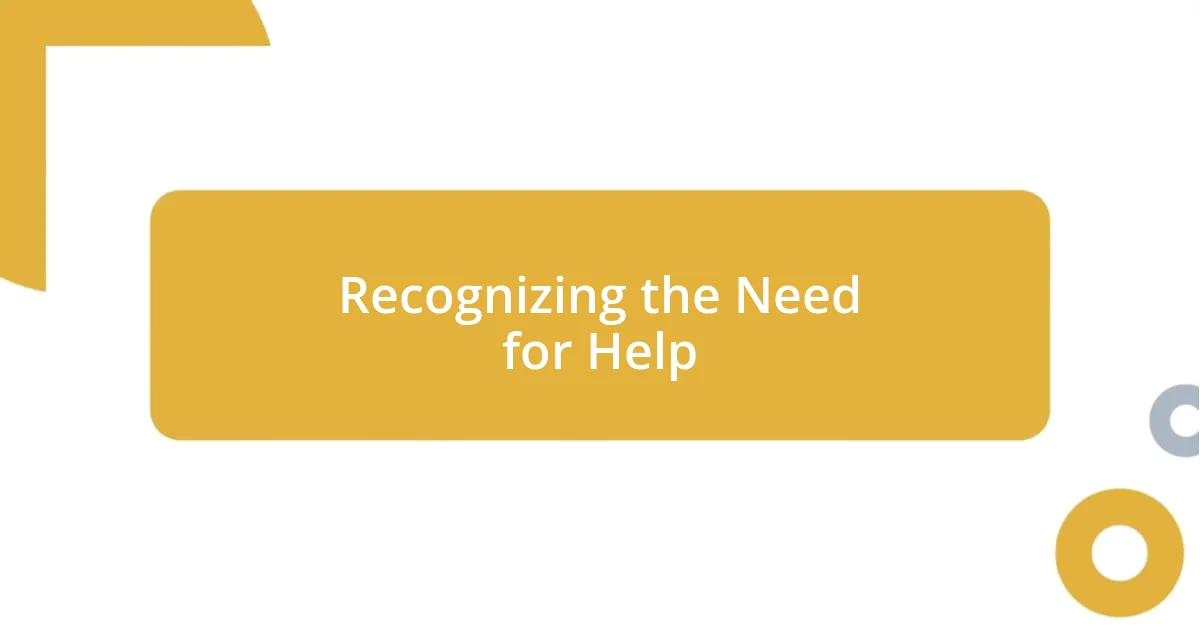
Recognizing the Need for Help
Recognizing that I needed help was one of the toughest moments in my journey. I recall staring at my reflection, realizing that the person I saw had become a shadow of who I once was. It was as if I was watching someone else live my life, separate and lost. The denial was strong, but that moment of clarity was a wake-up call I desperately needed.
Seeking help often begins with those quiet moments of introspection. I used to think I could handle everything on my own. But after countless sleepless nights and an ongoing cycle of guilt and shame, it became clear that I needed support. I had a friend who reached out, showing me that vulnerability could lead to growth. Have you had someone make a difference in your life just by being there? For me, that small act of connection opened doors I didn’t even know existed.
Sometimes, the hardest part of recovering from addiction isn’t the substances but admitting that I couldn’t do it alone. I remember feeling like I was standing at a precipice, afraid of falling if I stepped forward. Recognizing the need for help meant embracing uncertainty, but it also led to the most rewarding friendships and experiences. It felt like a burden lifted, even if just a little.
| Signs of Recognizing the Need for Help | Emotional Insights |
|---|---|
| Losing interest in activities | Realizing my joy was fading |
| Feeling isolated despite social settings | Experiencing intense loneliness |
| Increased reliance on substances | Confronting feelings of shame and inadequacy |
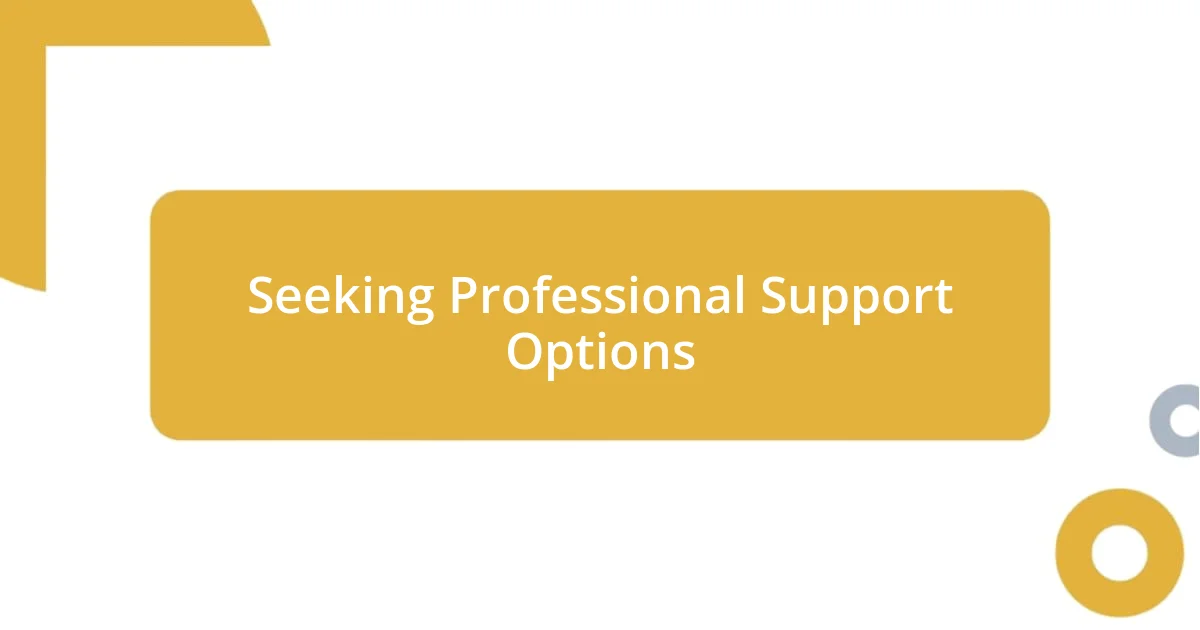
Seeking Professional Support Options
Seeking professional support was a turning point for me. I still remember my first visit to a therapist—it felt daunting. As I sat in the waiting room, I felt a mix of hope and fear. I thought, “Will they understand my pain?” But the moment I spoke my truth, it was as if a weight began to lift. Professional support can provide a safe space to unpack the emotional baggage we carry.
Here are some professional support options that I found impactful during my journey:
- Therapists: These trained individuals help unpack emotional struggles and teach coping strategies.
- Counselors: They often focus on practical steps for living a substance-free life.
- Support Groups: Sharing experiences with peers in recovery creates a deep sense of belonging.
- Rehabilitation Programs: These structured environments guide you through the early stages of recovery.
- Hotlines: Sometimes, just a phone call can connect you to immediate help and understanding.
I learned that seeking professional support isn’t a sign of weakness—it’s actually a brave step toward reclaiming one’s life. It’s about building a toolbox filled with strategies and insights that can guide us through the toughest days. Embracing this journey meant allowing myself to be vulnerable, which ultimately opened the door to healing.

Building a Strong Support Network
Building a strong support network was like discovering a lifeline in turbulent waters. I remember the first time I reached out to my family after months of silence. The phone felt heavy in my hand, but as soon as I heard my mom’s voice, I realized how much I had missed that connection. I often reflect on how crucial those moments of courage were, serving as the foundation for the relationships that would bolster my recovery.
In my experience, it wasn’t just about surrounding myself with the right people; it was about genuine connections. I sought friendships with others in recovery, and those relationships were transformative. We shared not only stories of struggle but also celebrated victories—big and small. It made me wonder, have you ever felt the power of shared experience? Those conversations, full of empathy and understanding, showed me that I wasn’t alone, and that communal support was essential in rebuilding trust in myself.
I learned that building a strong support network requires vulnerability and honest communication. At times, I was nervous about opening up, worrying that my struggles might push people away. But every time I shared my feelings, it felt like inviting someone into my world, creating an atmosphere of trust. The more I shared, the more I found others felt the same. I began to realize that my journey was intertwined with theirs, reinforcing the idea that together, we are far stronger than we could ever be alone.
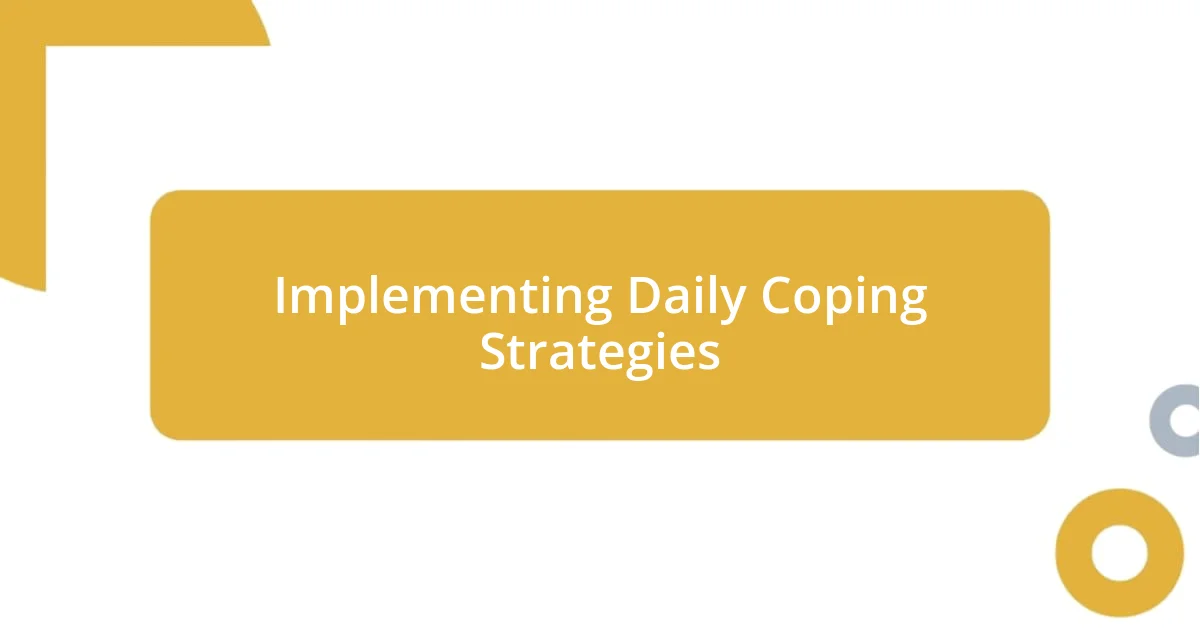
Implementing Daily Coping Strategies
Implementing daily coping strategies became a crucial part of my recovery journey. One of the techniques I found most effective was mindfulness meditation. I still vividly recall my first attempt—I sat cross-legged, eyes closed, but my mind was racing with thoughts. It felt impossible to silence my inner chaos. Yet, as I practiced breathing deeper each day, I discovered a sense of calm wash over me that I hadn’t felt in years. This daily ritual not only grounded me but also provided a safe space to observe my thoughts without judgment.
Another strategy was keeping a daily gratitude journal. Each night, I would reflect on the day and jot down three things I was thankful for. It wasn’t always easy; some days felt overwhelmingly heavy. But I learned to dig deep, finding appreciation in small moments—a warm cup of tea, a friend’s smile, or even a sunset. This practice shifted my focus from what’s wrong to what’s right in my life. In those moments of reflection, I often thought, “What would I choose to celebrate today?” It reminded me that even on the darkest days, there are sparks of light if we just take a moment to look for them.
I also made it a point to integrate physical activity into my routine. Whether it was a brisk walk in the park or a workout at the gym, finding movement was liberating. I vividly remember a day when I chose to go for a run, feeling the cool breeze against my skin and the rhythm of my heartbeat. In that moment, it hit me—exercise wasn’t just about strength; it was a celebration of life itself. It became a way to release pent-up energy and foster emotional resilience. Have you ever noticed how a simple walk can clear your mind? For me, these daily strategies were not just tasks; they transformed into essential lifelines, nurturing my spirit as I navigated the winding path of recovery.
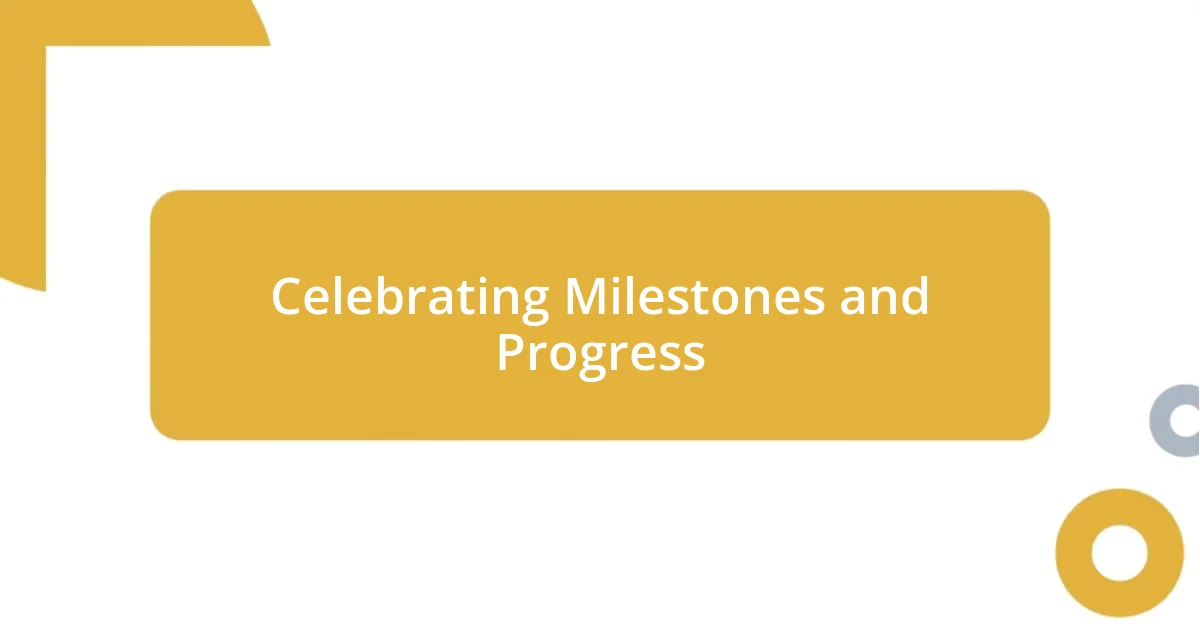
Celebrating Milestones and Progress
Celebrating milestones has been one of the most uplifting aspects of my recovery journey. I vividly recall the day I hit my first month of sobriety—a blend of disbelief and pride washed over me. I chose to treat myself to a special dinner, something I hadn’t indulged in for years. As I sat there, savoring each bite, I couldn’t help but reflect on how far I had come, and it made me ask—how often do we take the time to acknowledge our achievements, no matter how small?
I also found that sharing milestones with my support network amplified the joy of those moments. One particular night, my friends threw a surprise celebration for my six-month mark. I was overwhelmed with gratitude as I looked around the room, surrounded by faces that had cheered me on through my struggles. It struck me then—why not savor these victories together? After all, isn’t recovery as much about the connections we nurture as the personal battles we fight?
Each step forward, whether it was staying sober for a week or conquering a challenging day, became a reason to celebrate. I even started a tradition of writing down achievements and reading them on my birthday—a way to encompass a full year of progress. In those moments, I felt a deep sense of empowerment, realizing that every victory, no matter how small, contributes to the larger journey. Reflecting on your own journey, what milestones are worth celebrating in your life? I realized that acknowledging these achievements not only strengthened my resolve but also cultivated a deeper appreciation for the continuous growth in my recovery.
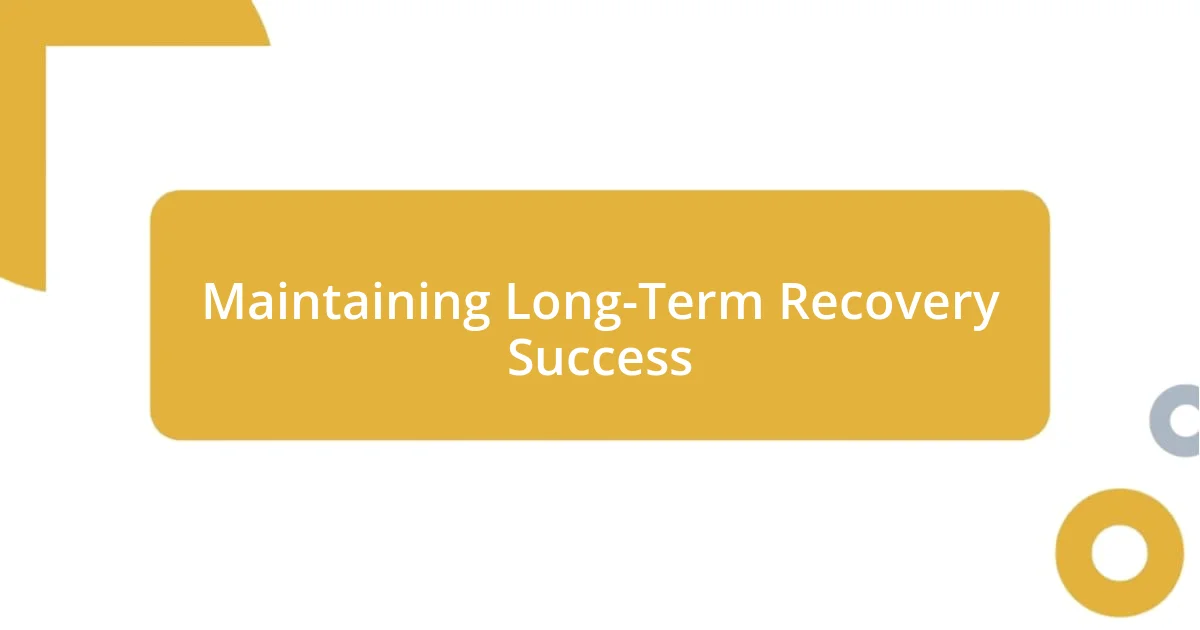
Maintaining Long-Term Recovery Success
To maintain long-term recovery success, I found that building a strong support network was pivotal. In my early days, I often felt isolated, like I was navigating my struggles alone. But then I joined a weekly recovery group, and it was a game changer. Sharing my experiences and hearing others’ stories reminded me that I wasn’t alone. Have you ever felt that weight lift when connecting with someone who truly understands? I still cherish those moments where authenticity flourished among peers. Each shared story was a reminder of resilience and hope.
Regularly checking in with myself became another essential practice. I developed a routine of self-reflection every Sunday evening, asking myself what went well in the past week and where I struggled. This honest assessment helped me stay in tune with my emotions and identify patterns. I remember a week where I felt unusually anxious, and during my reflection, I realized it was linked to an unresolved conflict with a colleague. Addressing that issue not only eased my anxiety but reinforced my coping skills. Have you tried pausing to understand your own emotional triggers? This simple habit was key in keeping me grounded and proactive on my recovery journey.
Finding joy in new hobbies also played a significant role in my long-term success. I took up painting, something I hadn’t explored before, and it surprised me how therapeutic it was. I recall one evening where I sat in front of the canvas, colors splattered everywhere, and felt pure peace wash over me. I was fully absorbed in the moment, reflecting on how creativity allowed me to express emotions that words couldn’t capture. Can you remember the last time you lost yourself in an activity that brought you joy? Embracing new passions became a vibrant outlet, reminding me that recovery is also about rediscovering life’s pleasures.










